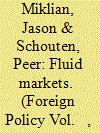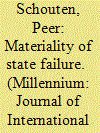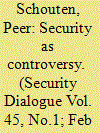|
|
|
Sort Order |
|
|
|
Items / Page
|
|
|
|
|
|
|
| Srl | Item |
| 1 |
ID:
124710


|
|
|
|
|
| Publication |
2013.
|
| Summary/Abstract |
It's a June night in Kinshasa, and rapper JB Mpiana's weekly VIP bash is just starting to heat up. Toned groupies splash like mermaids in a sunken pool. Middle-aged businessmen perch on the ledge above to watch. A minute before midnight, JB runs onstage among a huge posse of gyrating dancers in sunglasses. He rips into some of his biggest hits; a bombastic performer, he glides across the stage with a beefy grace, dressed in a hunter-orange jumpsuit and matching cap.
Most songs deal with the usual material, girls and gangbangers, in the Democratic Republic of the Congo's Lingala language. But when JB starts to chant the lyrics of his biggest hit of the night, the real purpose of this party -- festooned with yellow-and-blue banners advertising Primus, the beer that everyone would be drinking anyway, even at this lush downtown wine bar -- becomes obvious.
|
|
|
|
|
|
|
|
|
|
|
|
|
|
|
|
| 2 |
ID:
123587


|
|
|
|
|
| Publication |
2013.
|
| Summary/Abstract |
Congo's state failure is usually analysed in terms of a 'broken social contract', reflecting the degree to which mainstream understandings of state failure are conditioned by classical social contract theory. This article takes a different route to understanding Congo's predicament by building on insights from actor-network theory (ANT). ANT's insistence on society as a socio-material entanglement, it shows, translates into increasing attention to the role of material infrastructures in constituting governmental power. Conversely, this approach also allows the highlighting of the importance of the absence of the material underpinnings of rule in drawing up more nuanced accounts of state failure.
|
|
|
|
|
|
|
|
|
|
|
|
|
|
|
|
| 3 |
ID:
127802


|
|
|
|
|
| Publication |
2014.
|
| Summary/Abstract |
Critical approaches to security have come to define themselves against mainstream security studies by not a priori assuming what security is, but rather taking it as an 'essentially contested concept'. Yet, as evidenced by the way in which recent 'turns' in the field have played out in the debate around airport security, ontological assumptions about security tend to restrict the scope of empirical analysis, with airport security being studied as, for instance, either discourse or practice. This article aims to propose an alternative methodological approach to security by studying security as controversy. Studying security as controversy means refraining from making a priori assumptions about the ontology of (in)security, instead considering it as itself at stake in - and hence the outcome of - security governance efforts. The article elaborates on this approach by drawing on core insights from actor-network theory, a conceptual and methodological toolkit that allows, as I show, a focus on how security actors perform security by enrolling, assembling and translating heterogeneous elements into stable assemblages that can be presented as definitive security solutions or threats. The article illustrates this approach through a look at the case of airport security at Amsterdam Airport in the aftermath of the 2009 Christmas terrorist attempt.
|
|
|
|
|
|
|
|
|
|
|
|
|
|
|
|
|
|
|
|
|